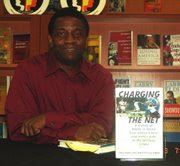
In light of umpire Jim Joyce's egregious call in Detroit tonight that denied Tigers right-hander Armando Galarraga a perfect game against the Cleveland Indians with two out and nobody on in the ninth inning, it is time to reprise a column I wrote last October on the pathetic state of major league baseball umpiring--and what should be done about it.
Since the 2009 postseason, baseball has done nothing to correct the atrocity that big-league umpiring has become. Thus, the work of the umpires continues to deteriorate.
Meanwhile, umpire and media hog Joe West has a publicist to tell us what city he's working in well before a series begins, which gives anyone bent on trying to fix a game exactly the kind of information he should not have.
Why MLB has not told West, "Either the publicist goes or you go," is beyond me.
West has called the New York Yankees and Boston Red Sox "a disgrace" because the teams routinely play four-hour games against each other. Perhaps having to work those games has severely cut into West's drinking time.
The real disgrace is the consistently inept work of West and his brethren in blue. Read on:
Nobody knows who’s going to win the 2009 World Series. But it is clear two weeks into the postseason who the biggest losers are: major league baseball umpires.
It has become painfully obvious that umpires can no longer call the plays in big-league games without more assistance from video replay technology.
Such technology is now used to determine disputed home run calls. Now, that same technology should be utilized to determine if a batted ball lands fair or foul, or if a player is safe or out.
There have been so many embarrassing blown calls, that it’s increasingly likely the World Series may be decided not by brilliant pitching (e.g., Orel Hershiser of the 1988 Los Angeles Dodgers), or phenomenal defense (e.g., Brooks Robinson of the 1971 Baltimore Orioles), or awe-inspiring hitting (e.g., Reggie Jackson of the 1978 New York Yankees), but rather by an umpire error.
In the fifth inning of Game 2 of the American League Championship Series, Derek Jeter was called out at first base when replays clearly showed the Yankees shortstop had beaten the throw. Instead of the Yankees having runners on 1st and 3rd with one out, they had a runner on third with two out.
Big difference.
In the 10th inning of the same game, the Yankees had the winning run on second base because an umpire ruled Los Angeles Angels shortstop Erick Aybar missed the bag on an apparent double play. Replays showed Aybar's foot brushed the bag.
Fortunately, the Yankees did not win the game because of an umpire’s misjudgment. But they could have.
Minnesota Twins fans remain convinced their team would have beaten the Yankees in Game 2 of the American League Division Series had left field umpire Phil Cuzzi not called foul an obvious leadoff double by Joe Mauer.
That Michael Cuddyer and Jason Kubel, the Twins’ next two batters, followed with base hits only added to Minnesota’s misery.
Umpire CB Bucknor personally blew three calls at first base in the opener of the Angels-Boston Red Sox A.L. Division Series.
Umpires missed three calls on the bases in Game 1 of the Philadelphia Phillies-Colorado Rockies National League Division Series.
And the Phillies’ winning rally in the ninth inning of Game 3 of the series was aided by an umpire’s mistake that put Chase Utley on base on a ball that had first hit his leg.
When viewers at home, watching frame-by-frame replays from multiple angles, are getting a better look at crucial plays than the umpires on the field, there’s a big problem.
Here’s a solution that should be implemented on Opening Day 2010:
Major League Baseball should assign a Booth Umpire to every game. The Booth Umpire will be the final arbiter on close plays on the bases, disputed home runs or whether a ball landed fair or foul.
The Booth Umpire would have the same access to frame-by-frame replays from multiple angles as TV viewers.
The Booth Umpire can buzz the home plate umpire whenever he wants to review a call, or the crew chief can ask the Booth Umpire — undoubtedly after being prompted by a team’s angry manager — to review a close call.
The argument against increased use of video replay technology is that baseball games would take too long. Well, games are already too long. The most important thing is to get the calls right.
Ball-and-strike calls would not be subject to replays. And it should not take long to decide if a ball was fair or foul, or if a runner was safe or out.
For baseball to do nothing at a time when umpires’ mistakes threaten to overshadow the excellence of the players and the excitement of the games would be the biggest error of all.


No comments:
Post a Comment